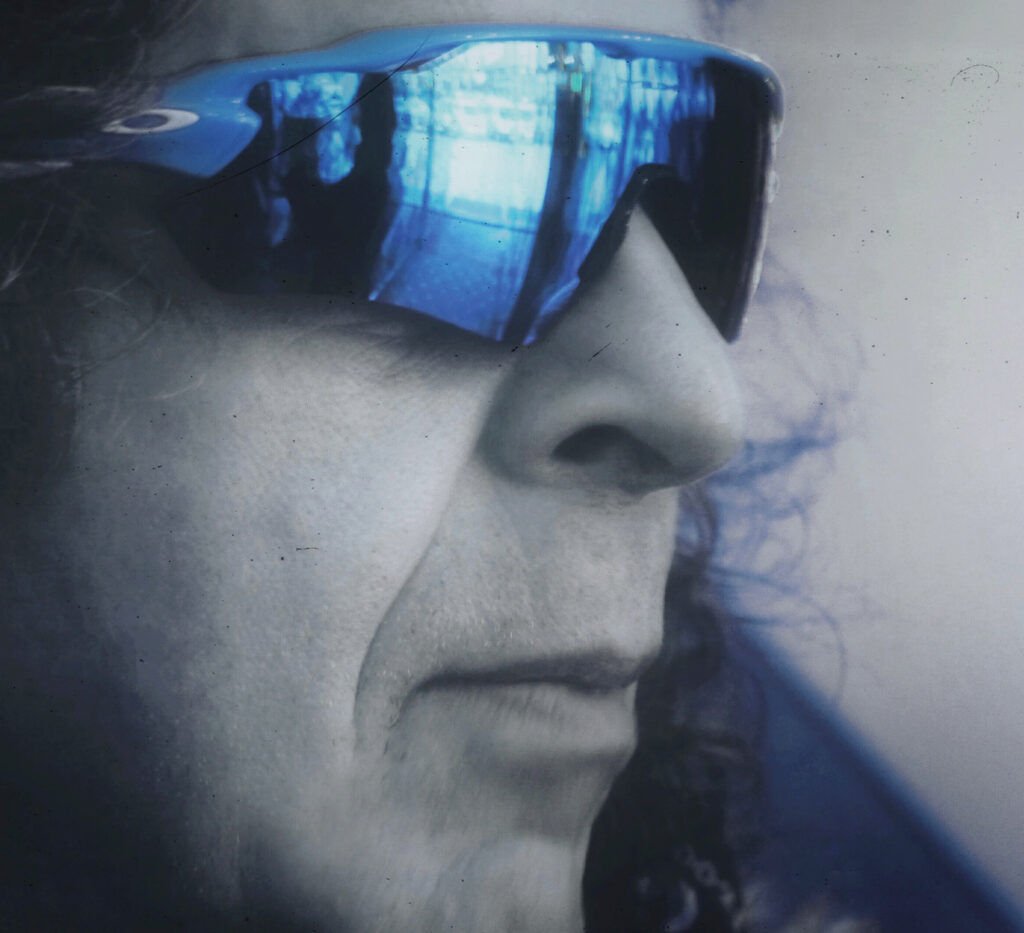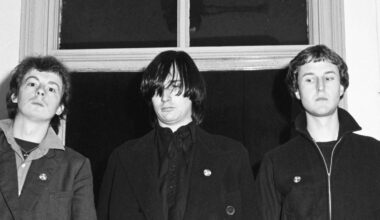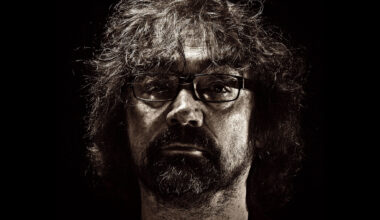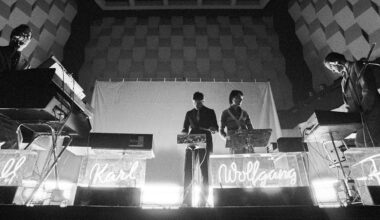From his seat at the top table of way-out-there electronica, Martin Rev reveals the thinking behind his newly released ‘Demolition 9’ solo album and discusses life after the death of Alan Vega, his long-time partner in Suicide
Now regarded as electronic royalty, Martin Rev has been charting his own fearlessly idiosyncratic course since he hot-wired a cheap organ and formed Suicide with Alan Vega in 1970. And while Suicide faced many attacks and obstacles, Rev conducted a parallel solo career as an outlet for his more personal visions, starting with his 1980 self-titled debut. He has now arrived at his ninth album with ‘Demolition 9’, an evocative landmark release and the latest pit stop on a remarkable musical journey that goes back to New York’s jazz lofts in the 1960s.
Completed before Alan Vega’s death in July 2016 and released on Atlas Realisations, the recently reactivated imprint run by original Suicide producer Craig Leon, ‘Demolition 9’ covers all Rev’s bases and more in miniature, featuring 34 wildly diverse vignettes that straddle electronic orchestrations, breathy doo-wop, electronic funk, garage thrash and coruscating circuit abuse. After the press release described it as “autobiographical” and quoted Rev “yearning for joy and the unattainable perfection of the artistic ideal”, I must admit I approached the album as if it was telling Rev’s personal story, marvelling at the concise family album-style snapshots that seemed to evoke his childhood, his epic relationships with Vega and his lifelong partner Mari (who passed in 2008), and New York, the city he stills lives in.
But as past experience should teach me, nothing to do with Martin Rev is ever as straightforward as it seems. ‘Demolition 9’ is another single-minded artistic statement, built from initial sketches that developed an organic energy and became flab-free statements in their own right – and not necessarily all about him.
“I know it’s been suggested in the promo that the album was autobiographical, but that never occurred to me while I was doing it,” says Rev in his cool cat whisper on the phone from New York. “It was more a matter of exploring different directions, balancing this collection of entities as a whole, and putting together things that were not compatible. If ideas were too weighted on one side, I would think, ‘Hey, let’s go for something a little more this or a little more that’, like cooking or something, spicing shit up. Some of the styles are recognisable from way back, but there are obviously some new ones being tried out, or tried in combination, or fragments of things done in the past developed a bit further.”
Very few of the tracks on ‘Demolition 9’ venture past the two-minute mark, with many lasting no more than half that. The result is a unique kaleidoscope of ideas stripped down to their bare essence.
“That kind of evolved,” explains Rev. “At first, I didn’t have that intention at all. After ‘Stigmata’ [his astonishing electronic classical epic from 2009], I was starting with a blank canvas and didn’t have any idea of that. It all came out of the music itself. I always tend to lay down a lot of ideas in the beginning, so I was working that way and not looking to finish anything, just getting those ideas down and coming back to them, hearing what worked, what didn’t work, and what had to be changed. Then I found myself working with a whole lot of tracks, not knowing which ones I might keep.
“I kept the tracks short because that’s what they seemed to dictate to me musically, by their own inherent dynamic. I found myself less and less interested in extending anything beyond its own internal necessity.
Once it was over, it was over. That happened quite fast and everything else after that seemed superfluous, unnecessary, and going in a direction that was more contrived and made less and less sense to me in the process of the work. If it’s not gonna be fresh, let’s just end it there. I also heard tracks as kind of intros or link-ups to what followed next, like putting together pieces of a puzzle that aren’t made to fit. I didn’t know which ones might work and which ones might not until I threw them all together, then shook them up to see what happened.”
Rev’s hook-up with Craig Leon follow 40 years on from Leon producing the first Suicide album, a milestone record in the history of electronic music. It came about fortuitously, after Rev decided not to release ‘Demolition 9’ on Blast First, a label he’s had a lengthy association with.
“Outside of an accidental encounter in New York once or twice, I hadn’t seen Craig since we did ‘Suicide’,” says Rev. “But we spoke on the phone and he mentioned a lot of very positive ideas, including getting his old label up again, and he wondered if I would be interested in doing something. To begin with, we were talking about doing a compilation of a few of my past albums. After my decision not to put this new record out with Paul [Smith, the boss of Blast First], I still hadn’t heard from Craig for way over a year, but then he got in contact again all of a sudden. He said things had evolved and his label was up and it was going through PIAS.

So it was just one of those converging events.
“When he heard the demo, which was pretty much the finished product at that time, Craig said he saw ‘Demolition 9’ as autobiographical. It was never in my mind that I was going to do that. Any kind of extra-musical idea that I might come in with generally feels like a limitation. You know, ‘I’m doing an autobiographical work, so now everything is reflecting that’.
Inevitably, something like a record is more or less personal because you’re using things that have moved you in the past – your ideas, what you’ve lived, or what you like. So I think that’s what Craig heard.
“Anyway, when he asked me to write something about the album for the promo department at PIAS, at first I said that I’d rather have other people write about it. But Craig said, ‘Well, just write a line or two, just start me off, and I’ll add some more’. So I wrote something about searching for unattainable perfection, or something like that, and sent it to Craig. Of course, it then appeared on every announcement about the record. I said, ‘Oh man, that’s not really what I want to tag on to this.’
“It’s really the music itself, the placement of the actual sounds themselves and what they tell you, that dictates to me where to go. It’s all in a language of sound. There’s no concept other than that musical process. What comes out in the end is often a big surprise for me too, except I take it to where I feel I can live with it, to reach that place where you know that’s as far as you can go. That it comes out sounding autobiographical is totally possible, even if that’s not necessarily what was consciously intended. It could easily be reflecting New York or all past and present loves, with different genres that reflect the periods of one’s life.”
The title of Martin Rev’s new album was born from an event that recalled the abuse heaped on Suicide in the years before they became hip.
“I had been thinking of titles for a while,” says Rev. “I find that titles get more and more difficult, especially for albums. This one came to me in an e-mail letter I received from someone who reacted in a very vehement and antagonistic way to everything that I had been doing [laughs]. It was like one of the worst reviews you’ll ever read in your life. Whatever was bugging this person had nothing whatsoever to do with what I do musically. It was more like what I represented to him, politically too. It was like the kind of hatred Suicide would get once in a while. But in that letter, I found my title. Out of this hatred, this total negativity, I found what I had been looking for and it became something positive. I added a ‘9’ at the end because it worked better for me and has connections to New York and what happened here [the 9/11 attacks].”
Talking of Suicide, Rev is characteristically cool but also obviously deeply moved about the passing of his old comrade Alan Vega, whose long-planned ‘IT’ album, completed before he died, is being released on Fader Records to mark the anniversary of his death in July.
“I last saw Alan at The Barbican in London, which ended up being our last show together. For the last several years, we didn’t see each other except for when we met on stage. Very occasionally we would talk on the phone. The fact that we hadn’t seen each other much helped dull the blow when he died. It helps when the person you are close to is not physically in your life every day. It was different with Mari, of course. Where Mari was concerned, it was the whole nine yards of losing such a massively significant person in my life.
“But my roots with Alan were very real and solid, part of my coming of age as an artist from the streets. It was definitely losing a buddy. We went through some really good wars, you might say. We started from scratch and broke our way into something that was just the two of us, with all the resistance you would expect for a new entity like that, because of the nature of what we did, from what we called it, to what it sounded like. It was like him and me against the world, a struggle for survival, but a very passionate and joyous one.
“Alan is a big loss, for sure, but I’m glad that he found his way out from suffering. I disagreed with his approach to recuperation, but he did it his way and, by that point, it was really his way or the highway. I wish him the best. May he be blessed, as they say.”
Martin Rev meanwhile continues in the questing spirit that’s always marked his work, still carrying the torch for individual artistic freedom which was Suicide’s original mission. With ‘Demolition 9’, he has just taken another fearless giant step in electronically created music, and that’s the same as it ever was.
‘Demolition 9’ is out on Atlas Realisations






